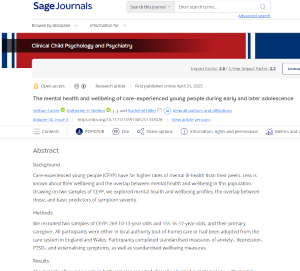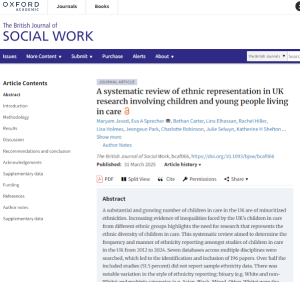ReThink: Mental health and transitions for care-experienced young people
Around one in 30 children experience public care before their 18th birthday. For most this means placement with kinship or foster carers, residential care or adoption.
These children have often had really difficult starts in life. Many have experienced neglect, abuse and other forms of early adversity, such as seeing violence and drug use. Once in care, children may be separated from brothers and sisters and live with many different carers.
We know that these experiences can have a big effect on young people, that lasts long into their adult life. Whilst some young people flourish in care or after adoption, many struggle with mental health difficulties. Compared to other young people, those who have been in care are five times more likely to have a mental health disorder, like anxiety, depression, post-traumatic stress disorder or behaviour problems. Failing to address the mental health needs of these young people has been linked to a range of poor outcomes that they may experience across their lives. This includes things like unemployment or homelessness and contact with the prison system.
While we have strong evidence showing the poor mental health and wellbeing outcomes of this group, there is very little evidence to help us understand what drives these outcomes. While many care-experienced young people struggle with poor mental health, some do not, even with similar early life experiences. We know little about why that is. The ReThink project addresses this question and will provide important information to help improve the lives of young people who have been in care. In particular, the project aims to produce the necessary evidence to develop better quality intervention and support programmes, for the children’s social care, mental health and education sectors.
This project is a collaboration with Adoption UK and CoramVoice.
Project aims
The aim of our research is to learn what processes are linked to the mental health and wellbeing of care-experienced young people and how they manage at two key periods, or ‘transitions’. These periods are:
- Moving from primary into secondary education
- Moving into adulthood
We want to understand the role of:
- Their experiences before they came into care
- Their individual psychological and social processes. This includes how they see themselves and others, manage emotions, and their feelings about support from friends and from the adults they live with
- The systems around them, like their experiences of placement changes and of being at school
What we found and what this means
We studied two groups of young people in care or adopted from care: 269 aged 10–13 and 155 aged 16–17, along with their caregivers. They completed questionnaires about mental health symptoms (like anxiety, depression, and PTSD) and about their wellbeing.
Most young people had high levels of mental health difficulties, especially the older teens, nearly half of whom reported poor wellbeing. For younger teens, mental health and wellbeing didn’t always match up, but for older teens, poor mental health strongly linked to poor wellbeing. Age, gender, and ethnicity didn’t consistently predict wellbeing, though older teens in residential care tended to struggle most. The findings underline the urgent need for early prevention and support to stop problems becoming entrenched.
Systematic review findings
We also reviewed 196 UK studies published between 2012 and 2024 that focused on children in care. We looked at whether and how these studies reported the ethnicity of their participants.
Over half of the studies didn’t report ethnicity at all. When ethnicity was reported, approaches varied a lot, sometimes using broad labels like “White” and “non-White,” and sometimes using more detailed categories. Overall, reporting was inconsistent and often incomplete. We recommend more consistent use of standard categories to improve future research and help inform fairer policies and practices.
What next?
We want to understand what processes are important for mental health, and what they mean for these young people’s wellbeing (like how they find school or work, or their general happiness). This will help social workers, teachers, and mental health workers better identify those who might need help, and design better support programmes.
We hope that more effective support could enable care-experienced young people to enhance their life chances to reach their full potential.
Papers

The mental health and wellbeing of care-experienced young people during early and later adolescence
Read the paper
A systematic review of ethnic representation in UK research involving children and young people living in care
Read the paperLead collaborators
- Dr Rachel Hiller, University College London
- Professor Lisa Holmes, Sussex University
- Professor Julie Selwyn, University of Oxford
- Professor Katherine Shelton, Cardiff University
- Professor Iram Siraj, University of Oxford
Partners on this project
University of Bristol
The University of Bristol is internationally renowned and one of the very best in the UK, due to its outstanding teaching and research, its superb facilities and highly talented students and staff. Its students thrive in a rich academic environment which is informed by world-leading research. It hosts the Elizabeth Blackwell Institute for Health Research.